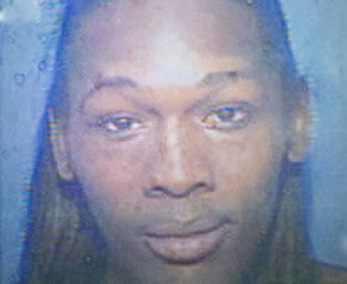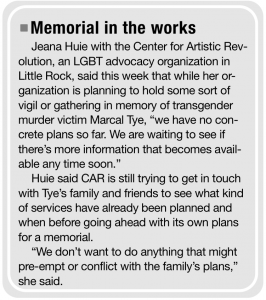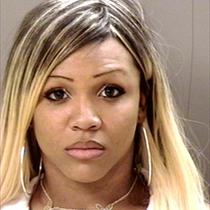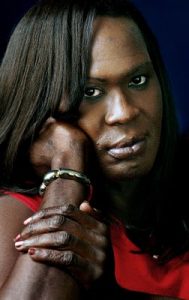 Shooting death of Marcal Tye in Northeast Arkansas raises specter of string of unsolved trans murders in nearby Memphis; activists say homophobia, transphobia still rampant in states’ rural areas
Shooting death of Marcal Tye in Northeast Arkansas raises specter of string of unsolved trans murders in nearby Memphis; activists say homophobia, transphobia still rampant in states’ rural areas
TAMMYE NASH | Senior Editor
nash@dallasvoice.com
Investigators with the St. Francis County Sheriff’s Department in Arkansas have no new leads in the March 8 murder of transgender woman Marcal Tye, according to Chief Deputy Gene Wingo.
“It’s kind of at a standstill right now,” Wingo said in a telephone interview Wednesday, March 16. “We have a lot of phone records and stuff to check, still, and that’s about all I can say right now.”
Tye, 25, was found shot to death in a rural area right outside the Forrest City limits early on March 8, and evidence at the scene indicated her body had been dragged by a car. Wingo confirmed that investigators had found two .32-caliber shell casings and had made plaster casts of tire tracks found at the scene.
Special Agent Steve Frazier with the FBI office in Little Rock on Wednesday confirmed that the FBI has “a pending civil rights violation investigation under way” and is assisting the St. Francis County Sheriff’s Department with the investigation.
Frazier said he was unable to comment further because the case is pending.
According to media reports immediately after the murder, a friend said Tye had been at a party at a friend’s house on Monday night, March 7, and had left there saying she was going home.
Tye’s body was discovered in the early morning hours on March 8 by a motorist on Hwy. 334, just outside Forrest City, who notified authorities.
 Possible hate crime
Possible hate crime
Because news reports published right after the body was discovered seemed to indicate that Tye’s body had been deliberately dragged behind a car either just before or after she was shot, LGBT activists from Little Rock, about 95 miles to the west, and Memphis, about 45 miles to the east, immediately raised the possibility Tye had been the victim of an anti-transgender hate crime.
Arkansas does not have a state hate crimes law, but the federal Matthew Shepard/James Byrd Hate Crimes Act passed in 2009 does include transgenders.
But St. Francis County Sheriff Billy May has since said several times that the shooting was “an ordinary murder” and not a hate crime. He said that while Tye’s body had been dragged by a car, the dragging appears to have been accidental.
May told reporters that Tye was shot to death and then the suspect appears to have tried to “straddle” her body with a vehicle while driving away, and that Tye’s body inadvertantly got snagged on the undercarriage of the vehicle. May said that tire tracks at the scene indicated the driver had stopped and backed up in an attempt to dislodge Tye’s body.
Frazier said the FBI has made no determination on whether the murder was a hate crime. That determination, he said, is based on evidence and the evidence gathered so far in the Tye murder is not conclusive either way.
But activists in the Arkansas capital of Little Rock, about 95 miles west of Forrest City, and in Memphis, Tenn., about 45 miles east, still believe anti-trans phobia played a role in the killing.
 Murders in Memphis
Murders in Memphis
The murder hits an especially raw nerve in Memphis, where at least three trans women have been murdered since 2006. And activists say many others have survived brutal attacks.
“Memphis has developed a reputation across the country for being a very dangerous place for transgender women, especially transgender women of color,” said Will Batts, executive director of the Memphis Gay and Lesbian Community Center. “There is a real climate of fear here.”
Batts said that as far as he knows, Tye was not known around the Memphis community center and did not access programs there.
“We do have a transgender group here at the center, but attendance is rather sporadic,” he said. “The trans women are afraid to come here. They don’t want to be seen here, to be publicly identified as transgender.”
One of the murdered Memphis women was Duanna Johnson, who made headlines nationwide in February 2008 after video of her being beaten by Memphis police officers in a police station booking area was leaked. Johnson survived that attack but nine months later was found murdered in North Memphis, killed by a single gunshot wound to the head.
Two officers involved in Johnson’s beating lost their jobs and faced federal charges, but Memphis authorities never filed any local charges against them.
That lack of action by local authorities is common in cases involving attacks on LGBT people, and especially on trans women.
“We have tried and tried to get a city ordinance [protecting LGBTs] passed here in Memphis and it has always failed,” Batts said. “The community center has been around for 22 years, and it is located in a fairly progressive and diverse part of the city. But other areas of Memphis are much, much more conservative and anti-LGBT. We have a lot of strong churches in Memphis, a couple of mega-churches, and a lot of our lawmakers have some very strong ties to those churches.”
Marisa Richmond with the Tennessee Transgender Political Coalition, headquartered in Nashville, agreed that violence against LGBT people and trans women in particular is “much more common than it should be” in Tennessee and especially in the Memphis area.
“Memphis is, I think, a city that feels under siege, specifically the transgender community and especially African-American trans women,” Richmond said. “We have made some progress here in Nashville, but they just can’t seem to gain any ground in Memphis. I think it is making them very, very frustrated.”
Richmond said that some people have suggested that there may be a serial killer targeting transgender women in the Memphis area, but she says there is no real evidence to support that theory.
“I can’t say that possibility doesn’t exist. But I think it’s not a matter of one person, a serial killer, targeting trans women. It’s the atmosphere, the attitude toward LGBT people, toward trans people, in general that is the problem.”
Reaction in Little Rock
Jeana Huie, coordinator for the youth/young adult program at the Center for Artistic Revolution, an LGBT advocacy organization in Little Rock, said this week, Arkansas also has its progressive havens and pockets of phobia.
“The climate [toward LGBT people] is different in different areas of the state. In places like Little Rock and Eureka Springs, it’s pretty progressive. But in the more rural areas, there’s a lot more hostility, more violence, though most of it is verbal, rather than physical,” Huie said.
“It [physical violence] doesn’t happen a lot, but it does still happen. It probably actually happens more than we realize but it just isn’t reported.”
Huie also said that her organization knew little of Tye or her murder other than what has been reported in the media. And she said that CAR had responded to early media reports that described Tye as a crossdresser, a “man in a dress” and a “man in drag” by trying to educate reporters on the correct language to use in reference to transgender people.
CAR was, she said, pleased at the response they received from media outlets in the area.
“When we saw the language that was being used, we put together some educational materials, including a guide we downloaded from the [Gay and Lesbian Alliance Against Defamation] on the language to use when reporting on transgenders, and we went to every national affiliate here in the Little Rock area,” Huie said.
“We actually got a really good response. We were a little surprised at how well they responded to us,” she continued. “When it came to the garish headlines and coverage, I think it wasn’t so much about them being homophobic or transphobic, but more about just a lack of knowledge.
“They all told us they were glad that we came to talk to them and they were glad to have the resources we brought them,” she said. “And most of the stories and headlines [that were objectionable] were changed very quickly after that.”
Huie said her organization was not so satisfied, though, with statements by Sheriff Mays in St. Francis County.
“He has made some pretty callous comments , and he continues to use some problematic language,” she said.
Huie said CAR has had no contact with the St. Francis County Sheriff’s Department, but that the organization has been in contact with Department of Justice representatives in Little Rock and with the LGBT liaison in the FBI’s Little Rock office.
This article appeared in the Dallas Voice print edition March 18, 2011.
_________________________________________
The Memphis victims
LGBT activists in Memphis say their city has developed a national reputation as a dangerous place for transgender women, especially for trans women of color, in the wake of the murders of at least three African-American trans women there since 2006, and attacks on several more.
The attacks, according to Will Batts with the Memphis Gay and Lesbian Community Center, have created a “climate of fear” in the city.
Trans women who have been murdered or attacked include:
• Tiffany Berry, 21, murdered Feb. 16, 2006 in North Memphis. Berry was shot to death as she exited her apartment, and police soon arrested D’Andre Blake, who allegedly bragged to friends that he had killed Berry because he didn’t like the way she had touched him.
Blake, however, was released on bond of only $20,000, and remained free for more than two years until August 2008, when he was arrested again, this time for the murder of his own 2-year-old daughter.
To date, Blake has not been brought to trial in connection with Berry’s death.
• Ebony Whitaker, 20, murdered July 1, 2008. Whitaker, who relatives later said had had a troubled home life and had received little support or care from her parents, had a history of prostitution dating back to age 16. Her body was found, with a single gunshot wound, in a parking lot near a daycare center in Southeast Memphis.
No one has ever been arrested for Whitaker’s murder, and no suspects have ever been named.
• Duanna Johnson, 43, murdered Nov. 9, 2008. Johnson became the subject of national headlines in February 2008, when a videotape showing two Memphis police officers beating her in the booking area of a Memphis police station was leaked to the press. Johnson said at the time the officers began hitting her after she refused to respond when they spoke to her using anti-trans slurs after she was arrested on prostitution charges.
In the videotape, Officer Bridges McRae is seen striking Johnson repeatedly with his fists and with a pair of handcuffs clutched in one hand as she sits in a chair. A second officer, J. Swain, is seen holding Johnson down as McRae hits her. Both officers were fired and later faced federal charges, although local prosecutors refused to level local charges against them.
Ten months later, Johnson was found lying dead in a downtown Memphis street with a single gunshot wound to the head. No one has ever been arrested in the murder, and no suspects have been named.
• Leeneshia Edwards, shot Dec. 23, 2008. Friends and family members said Edwards worked as a prostitute, and investigators said she appeared to have been in a car with someone and had turned to get out of the vehicle when the suspect shot her at close range in the jaw, side and back.
The attack, which happened in south Memphis, left Edwards in critical condition and she had to undergo several surgeries. No one has ever been arrested in the attack, and no suspect has been named.
This article appeared in the Dallas Voice print edition March 18, 2011.

















